Some posts only go to subscribers via email. EXCLUSIVELY.
You can read more here or simply subscribe:
Should writers be Americans-only? [& February Mini Report]
If you’ve read my post about how we hire freelance writers, you know that when hiring, we target only American writers. Not only native speakers of English but writers who actually grew up in the US and are native speakers of American English.
Why? Is that smart? Should we change that? I know it’s a sensitive subject for some people, but I think it’s worth discussing as it may have significant implications for any web publishing business. And since I haven’t done it yet, I’ll also attach a quick recap on February here, and what traffic and revenue were like.
Contents
Why we only work with American writers
I’ve learned over the years that this is a sensitive topic for some people. I can see how mentioning a country, rather than a language, may seem to carry some nationalistic overtones.
Let me clarify at the beginning of this discussion that for me, this is purely a business decision. Thrilled to be living in such a global day and age, I’m happy to be working with people from all over the world. Our server admin is from Scotland, we work with developers from Bangladesh and India, and our awesome VA’s are from the Philippines.
What’s more, I’m not an American myself. We live in Israel and I’m not even a native speaker of English. I wouldn’t hire myself as a writer, although I have written some of our content (I write everything on Yeys.com too).
With that out of the way, here’s why only hire American editors and writers.
Targeting a US audience
Our business model is based on monetizing traffic using display ads and some affiliation revenue. We currently monetize mostly with Mediavine, Amazon, and Ezoic. When checking revenue stats, it’s easy to see that US traffic is far more valuable. This is what it looks like in Mediavine –
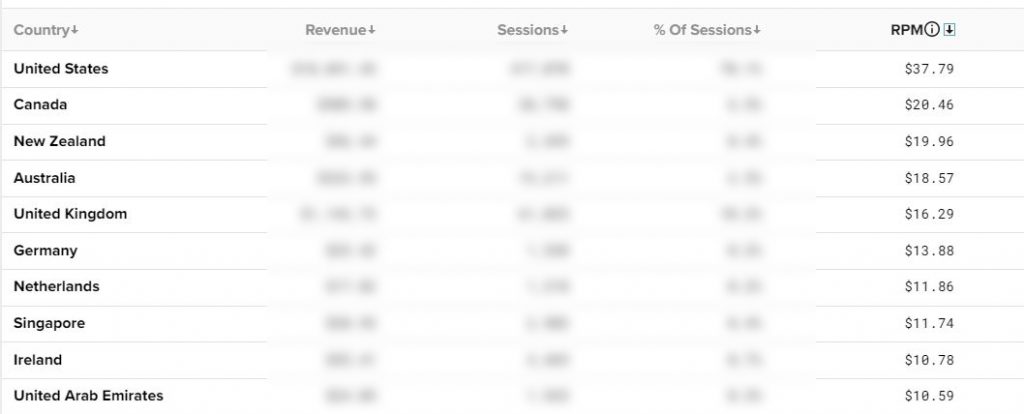
And it’s a similar picture over at Ezoic –
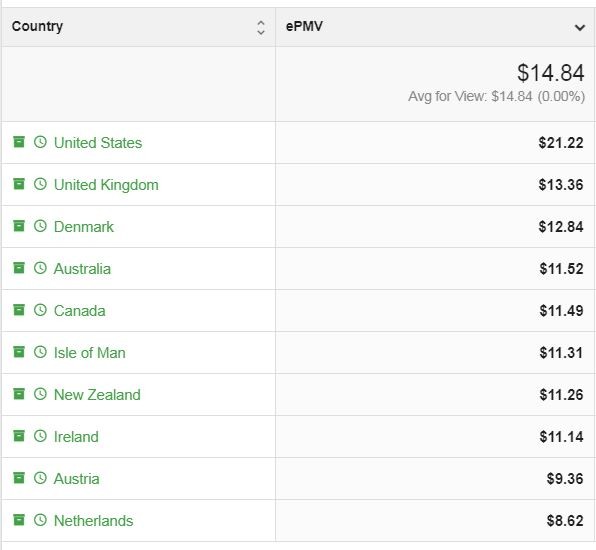
Clearly, getting US-based traffic to our posts is important. We get more money when that happens. A lot more. What’s more, if you don’t have at least 70% US-based traffic, you might have a hard time getting accepted into Mediavine or Adthrive. Ezoic is happy to monetize any kind of traffic (not just English-speaking) but as you can see, the RPM’s are just lower with non-US traffic.
How to get US traffic?
That’s a great question, and it’s been on my mind a lot. We actually have a problem with a couple of the sites not meeting the 70% US-traffic goal, limiting our choice of network to Ezoic alone. Ezoic isn’t a bad option, but a. I don’t like that options are limited and b. as you can see, it means overall RPM rates are lower.
Obviously, a good way to make sure you’re targeting the US market is by making sure to use American English. The right kind of spelling and the right kind of words and – to some degree – the right kind of grammar.
Some people say that’s easy to do. Maybe. It’s definitely not easy for me. I learned English in school and then took a degree in English Literature at university. My English teachers over the years came from the US, the UK, Australia, South Africa, and Canada. I traveled in the UK, Canada, and the US quite a lot. I watch a lot of British, as well as American, TV. I can easily tell accents apart – at the country level – but I’m sure my own English is mixed. And my accent is just plain old “struggling foreign speaker”.
Going beyond the language
Even if your writer can imitate American English to perfection, there’s a cultural issue at play too.
I’ve traveled a lot in the US, and yes, I know there’s a lot of regional cultural differences across the country. Some even go as far as saying there are separate mini-nations within the United States. However, as diverse as it is, the United States is still one country, with a distinct cultural flavor. And my impression – having traveled in 45 states to date – is that there’s also a distinct commercial flavor.
For example, the difference between a British and an American perspective on vehicles goes way beyond trunk vs. boot, or which side of the road you’re driving. It’s not just a matter of the stereotypical American “truck culture”, either. There are so many other nuances in how vehicles are perceived in either country: Who drives what, at what age, how, and when, etc.
Vehicles are just an example, the same differences apply to so many aspects of daily experiences, most people never stop to even consider them. That’s why myself – and many other web publishers that I know – prefer to work only with American writers. It’s not that they’re better, they’re just more likely to write in a way that’s helpful to an American audience. And that’s the audience we want to attract to our websites.
How we make sure writers are actually American
When we publish an ad looking for writers, we ask that only people who are native speakers of American English apply. This requirement is clearly stated all over the place: In the ad itself, on our landing page (twice!), and even at the top of the application form. Impossible to miss.
But how do we know if these people really are from the US?
The first filter is in the form itself. We ask them to state where they’re from originally and where they’re located now. Most people are honest – and possibly haven’t bothered to read our ad at any point as they are trying to apply to as many ads as possible. They just state where they’re from and we can disqualify their application at that point.
We did have a problem with a couple of writers lying their way into our system. We had three indications that they weren’t who they said they were –
- They submitted texts that were clearly non-Americanized (using kilometers and kilograms, for example).
- PayPal required additional verification steps when we paid these people (something that can also happen with American freelancers, so we don’t go by that alone).
- Finally, we checked the IP addresses for suspicious accounts.
At some point, we decided to filter applicants using interviews and that solved the problem. These interviews take about half an hour, and we don’t expect the writer to tell us too much about herself or himself. We use the time to talk to them about our who we are and walk them through the workflow that we have, showing them how we use Clickup. These interviews ended up helping writers to start working with us right away, and overall, seem to get them to write more and stay with us for much longer. I think there’s a better sense of commitment when they get to know us as people, not just a remote work supplier. And it also helps us make sure they are in fact Americans.
Is an American editor enough?
Our production workflow includes an editing phase. Our editors read each post and use a checklist to make sure every requirement was met. We currently have three editors – all of them Americans. That helped us catch those non-American writers.
I’m at a point where I wonder if maybe a good American editor would be enough. Could we use non-American cheap offshore writers, train them properly and hire them to produce content that would possibly be less-than-stellar but good enough for an American editor to go over and fix in under an hour of work time.
I don’t have a good answer yet. If anyone reading has tried that, I’d love to hear how that went.
February 2021 Report
Finally, if you’ve been following this blog for a while, you’re probably wondering how our business is doing these days. In case you’re new to this blog, here’s the mandatory recap –
I’m Anne and together with my husband we own and manage a portfolio of 15 content websites. Our team includes three editors, six VA’s, and over 60 freelance writers. We publish around 400 new posts every month, investing a total of around $30,000 into our business.
During 2019 and 2020 I published detailed traffic and revenue reports, detailing our journey from making zilch (and losing quite a bit) to the current point. I no longer publish detailed reports, simply because I don’t have the time for that anymore. Instead, I try to publish one post on Yeys every month and tuck an overview of the previous month’s stats at the end of that post.
February 2021 traffic and revenue
February is never much fun to report, simply because it’s three days shorter than December and January. There’s a built-in decrease of about 10% just because of that. What’s more, this being the first quarter of the year, RPM rates are still sluggish and traffic patterns in our more seasonal sites are still very “blah”.
But, it is what it is, so here goes.
February’s Traffic Stats
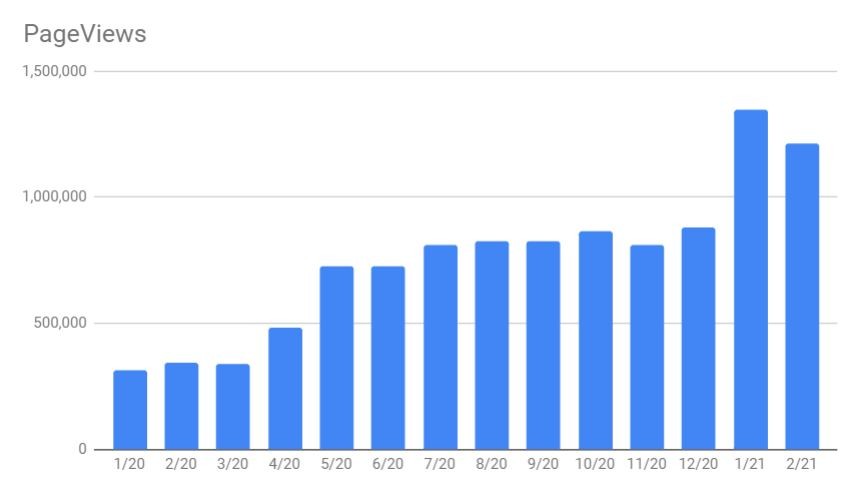
Traffic went down from 1,347,343 in January to 1,210,538 pageviews in February. That’s actually about the expected 10% decline that comes from February being a short month, so traffic stayed pretty much stable. That doesn’t make me very happy, considering the amount of content we published over the past six months. I was expecting to see a 10% increase, despite it being a short month.
As far as I can tell, we weren’t hit by some penalty or algorithm update. Our posts still rank high, but search volume is down. I’m hoping this is just some kind of seasonality at play here. Still, not fun. It’s the same boring plateau in March so far and I’m seriously dopamine-deprived here.
February’s Revenue Figures
Things were a bit better in terms of revenue. We moved from $46,205 to $44,693. Revenue was going down, but not in correlation to the traffic decrease.
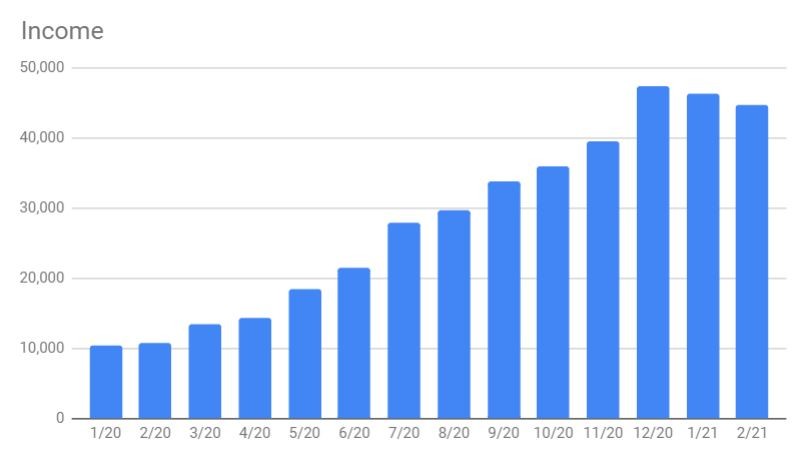
Actually, my husband created this “dopamine chart” for me, where he adjusted revenue to 30-day increments.
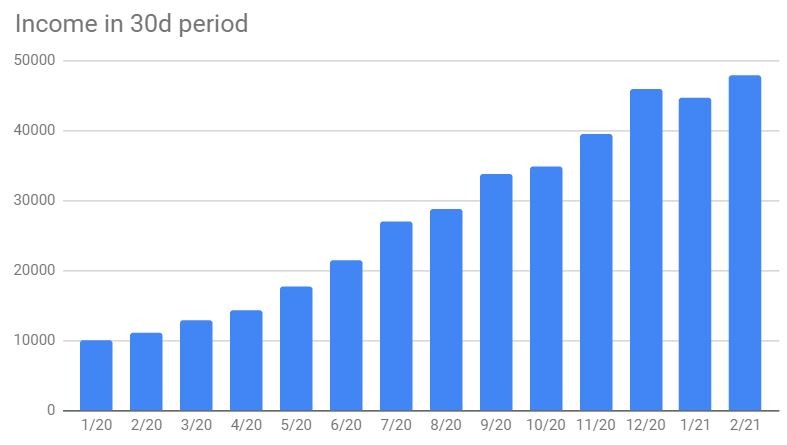
What this basically means is that daily revenue was pretty good in February. The best we’ve had so far. It also means that if you disregard the December holidays fluke, we’re on track with the same monthly growth trend.
In terms of expenses, we published 406 posts during February. With that in mind, we’re still at the $28K monthly costs for content. This figure includes writing, editing, stock photos, and VA work. If you add in things like hosting, software, and general business expenses, we are at the $30-31K mark.
By the way, general business expenses are growing. In February, we finally finished incorporating as an LLC in the US. We hired an accounting firm in NYC and they’re not cheap, but came highly recommended for our unique situation, so hopefully, they’ll be worth the expense.
So, nothing too exciting. The expected February Blues. March isn’t looking much better, mind you. Just the same grind as before. I think we’ll have yet another increase in revenue numbers but I don’t think it’s going to be very dramatic. I am ready for Q1 to be over!

Right now I have 11 writers. 4 are American the remaining are a melting pot of other nationalities including Canadian, African, Pakistani, Croatian, Filipino. My US writers are great, and at the highest end of my pay scale but, my two African writers are right up there with them. When I hire, that probably makes the process a little more difficult for me as sample works are typically very well polished but the first test article submitted varies widely in quality. I wind up throwing out 50% of the 1st round test articles but, I also typically am only paying 1.2 to 1.5 cents per word for the content.
Editing is an area where I only hire US based editors. They are able better able to correct any grammar issues as well as provided feedback in ClickUp to the writer. After a few times with feedback for UK grammar, the writers improve.
Editors do track the time per article and in ClickUp. I track writers and editors using the “Contributors” custom field. During my monthly audit I’ll pull a report that shows the average time an editor spends per article as well as the average time for editing per writer. 15 minutes is the norm for all of my writers (regardless of nationality) so anything too far outside this gets a closer look and I make decisions from there.
Scaling, in general, is definitely a process. I find myself growing and adapting every month and reading your blogs each month has been a great inspiration!
Sounds like a fantastic setup, April! I have thought about asking our editors to track editing time on clickup, but we felt it may be too annoying to have to deal with that. Reading your comment, I’m thinking we should do that and use the data in a similar way. Thank you so much for sharing that!
I used to only hire American writers, but since the December Core Update cut my traffic and income by about 80%, I started to look at some cheaper options. Right now, I have a few writers from Venezuela, Azerbaijan, and India, and to be honest, they do a great job. Most are cheaper than my American writers and I even found one with a rate of $0,01 a word that does the writing just as well as my American writers.
I’m not American myself either (Dutch), but so far I’m happy with the quality and the articles also actually rank/start to rank. I do think I could benefit from an American editor, just to make sure my writers hit the points you mentioned in this article, but I do think that writers with other nationalities are worth a try!
That’s very interesting, Jasper. Thank you for sharing your experience and I’m sorry to hear about that traffic hit. I hope things will balance out with the next update!
Hi Anne
Great article. I had read many of your posts before I found out that you were not a native English speaker. I was genuinely taken aback because I had always assumed that you were.
Keep up the great work!
Keith
Hi Keith,
Great to see you here! And thank you for the compliment. We should get on a call sometime and you’ll see how easy it is to tell once I start talking lol
I so love reading your posts Anne … truly inspiring as always. I just don’t understand how your RPM/EPMVs are so high. My sites are all YMYL with legitimate 99% US traffic monetized with Ezoic/Amazon and I can’t seem the get my RPMs above $8(Ezoic) + $4(Amazon) = $12 RPM. And, I pay for the Ezoic premium add-on. I would love to see you do an article on niche-based RPM maximization as having even a $20 RPM would be a game-changer for me.
Hi Patrick,
That would be an interesting topic for a post. There’s a lot I’ve learned over the years on how to bring RPM’s up, but I can’t really tell what’s working and what’s not. I just try it all. I do think at least some of that is related to the size of the site. Our highest RPM rates are with our two largest niche sites.
I have tried taking the cheaper writer route with an editor to clean it up but my editor was spending so long that it wasn’t worth it. Hope you can get different results and teach us how 🙂
I (as an Australian) used to wrote for all my American sites and got great results. Over the years, I did realise how many little things i got wrong though. Initially, I just thought it was writing “realise” instead of “realise” but they have so many different names for things and different expressions.., so I can see why American writers could help. I’m personally yet to use one though (just coincidentally only used Australian and British) and I don’t think it’s hurt at all.
Do want to add that you don’t need 70% American traffic for mediavine (unless it changed in last year). I’ve had a couple of sites with them and neither hit that. They wanted 70% of traffic from US/Canada/uk/Australia. My 99% Australian traffic site was on there (although made more when I moved it to ezoic anyway)
Great input there, Sharon! Thank you! I didn’t know that about Mediavine – I think that site of mine that’s borderline does meet the 70% point for traffic from any English-speaking countries. I’ll check with my MV rep and see.
Thanks for another great article Anne. I’m afraid I don’t have any answers for you.
I have to admit to being fascinated reading all the non-Americans on here trying to make sense of Americans. I was born in Kentucky and have never lived anywhere that wasn’t along a 60 mile stretch of I-64 in the heart of the Bluegrass state. All I can tell you is good luck with figuring Americans out.
Don’t feel bad about not being able to figure us out. In the over 2 centuries we’ve been a country, we’ve been trying to figure us out too, and we seem to get farther from it every year.
Love your work.
Hey Anne,
Excellent content! Very helpful nitty-gritty stuff. I have a successful site with extra money now to hire writers and scale the content production process.
I too feel that I’d prefer to hire only American-born native English speakers. But then I think about paying them… and TAXES! I do have foreign VA’s so no problem there, but hiring US citizens (if you/your business is also a US taxpayer) is a different ball game.
I’ve read up quite a bit on this and unless I’m mistaken, if I pay a US citizen writer more than $600/yr. I have to issue that writer a 1099. Maybe no big deal if you only have a few, but a lot of work for 20+.
But the real kicker is the complicated maze of IRS laws you must contend with.
Of course, you want to classify these writers as “independent contractors” so, you as employer don’t have to pay any taxes related to the contractor’s wages. But the IRS has rules about what actually qualifies. Turns out it just isn’t “by agreement” between employer and contractor.
For instance, if you require them to follow certain guidelines and/or use your tools (and several other rules)… the IRS could decide that no, actually you have “employees” and then you’re on the hook for a bunch of FDIC, SS, Medicare taxes, etc.
Now, you’d probably have to get audited for any of this to happen (re-classified as employees) and the chances are low, but still.
I’ve thought maybe the solution is using Canadians or hoping to find very good Filipinos, etc.
Wondering what is your perspective on this issue and how you’ve handled tax compliance hiring US citizens?
Really appreciate any experience and advice here.
Thanks,
Ryan
P.S. (I posted this first on a different article not as related… sorry for the duplicate comment).
Hi Ryan,
You raise some good points there. We have a similar setup here in Israel which caused us to avoid working with Israeli contractors. I think that’s a good example of how too much regulation ends up hurting the people it was supposed to protect in the first place.
Now that we started operating as an American LLC, we will be issuing 1099 forms to all of our contractors. Our CPA will take care of that at the end of each tax year. They don’t think it’s a huge deal, and since they know how to do that and I don’t have to do anything about it myself, I’m fine with that. The writers work on 2-4 articles per month on average, so very unlikely to be considered employees at any point. We had one editor who consistently was at over 20 hours per week and we ended up hiring her as a full-time employee on the payroll, with all the legally mandated benefits and taxes. We may do that in the future with another editor, and I’m fine with that. Actually hiring good people is a good thing for a business, IMO. And yes, we pay an HR company and our accountants a LOT of money every month to make sure everything is done by the book. To me, it’s all part of the natural growth process for a business.
Hi Anne,
Thanks for your reply. You raise good points as well about “hiring good people” as a priority despite the extra cost (but often saves you a lot of time, hassle, and headaches hiring, training, firing, searching, re-hiring… ugh) and the cost/taxes associated with the “natural growth of a good business”. Appreciate your perspective.
Where do you find the writers and how much do you usually pay?
Hi Markus, I blogged about that here.
I somehow missed that article. I will read it now. You are sharing awesome info on this site. I’ve been following your journey for a few months already. Good luck with your project and keep posting earning reports 🙂
Hey, Anne, every day I see your blog post and your post on the JOHN forum. All is really well, appreciate it! Do you provide any service locally or globally in your blog or you just mainly focus on your blog and main earning surce is Display Ads?
Many times I realized African continent based writers are not so bad (Nigeria, Kenya and many others) I think their tone is almost similar in writing like an American. As I know they are not from the USA and any other Native country so it’s expected they will not write as American writers do, they can make some mistakes sometimes. But I noticed most Native writers charge a lot $30/$40 and sometimes up. But other writers take less and quality isn’t much poor.
I think you know well about “Morten Storgaard” (Passive Income Geek) who has most of the writers mainly from the African country and he pays well for his all writers. Finally, do you think Non-Native writers can perform well when the main target is USA?
Hi Rahul,
Great to see you here. I don’t provide any services on any of the blogs – just display ads and some Amazon affiliation links.
Good points there about offshore writers. I should probably adjust this post as I’ve started working with a few and so far, I’m happy with the results. We do have US editors who go over all content and make sure it’s fully Americanized though.
Recently I sold a website for $40k For $40k On The Motion Invest Marketplace. All writers, and editors from Asia. So, I think we can hire writers from any country.
Yeah, I actually agree, Tangeer. I should update this post sometime, but I believe I already mentioned in the comments that we now work with offshore writers, as well as US writers.
Nicely put together, Anne. But as it’s being more about blending more expertise into contents day by day(EAT or EEAT), what do you think is important writers with true niche expertise?
I think both EAT and EEAT are just part of the guidelines for the manual quality checkers. I wish Google had a way to figure out EAT, but I don’t think they do. Except for relying on a site’s link profile (which can be manipulated by buying/building links).
It’s always better to have a writer with either expertise or at least an interest in the niche. It would be easier for them to write a good article. But I don’t think it matters for ranking.